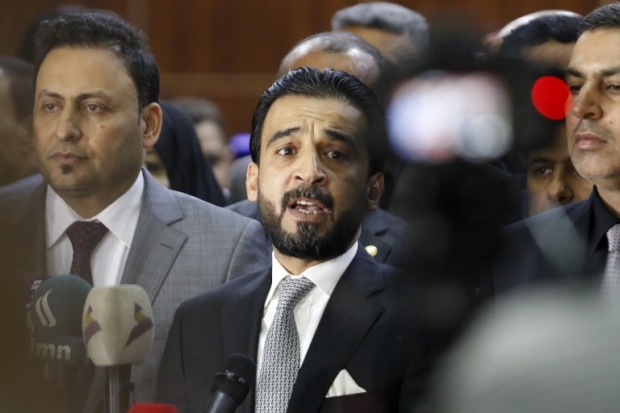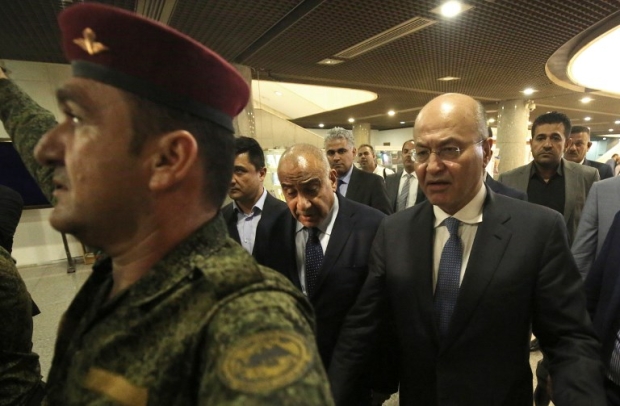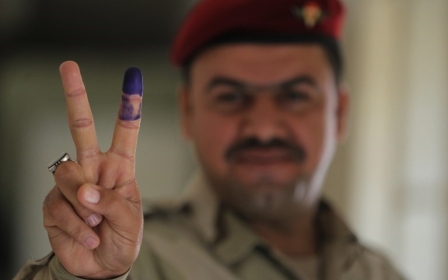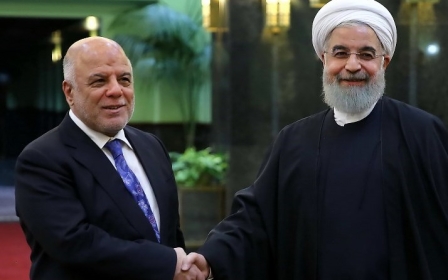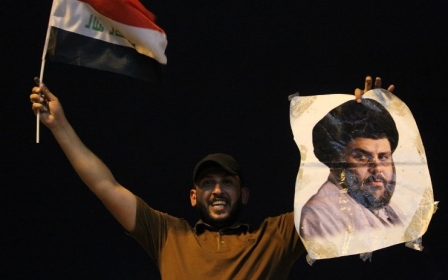Iraq's new leaders can't be reduced to a US vs Iran binary
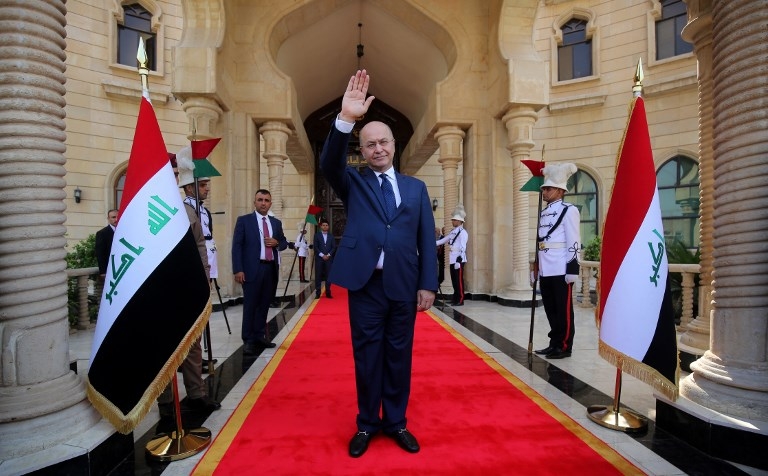
As of Thursday, Iraq's highest executive positions have been announced, with 14 out of the 22 cabinet posts allocated. Key posts remain vacant, and Adel Abdul Mahdi, Iraq's new prime minister, will hold the unallocated portfolios of ministers of defence and justice.
The new ministers will now join Barham Salih, Iraq's new president, and Muhammad al-Halbusi, the speaker of the parliament, at the helm of an Iraqi state that needs to tackle seemingly insurmountable domestic challenges, ranging from protests in Basra to reconstruction after the Islamic State group invasion.
Internationally, these three leaders will also manage the delicate balance of power between the US and Iran over Iraq, as well as the nation's relations with the broader Arab world.
Reductionist approach
The four major influencers on the selection of these three leaders included two domestic actors: the victorious Sadrist camp and their parliamentary rivals belonging to Shia militias - some, but not all, with sympathies to Iran. The two international actors included Iran and the US.
US and international media will invariably seek to dissect how these leaders align with Iranian or US foreign policy, exemplified by headlines in American, Israeli, French and Turkish media outlets, such as "Iraq elects pro-Iran Sunni as parliament speaker".
Like many of Iraq's current political elites, Abdul Mahdi and Salih were exiles from Saddam Hussein's Iraq, and most of these exiles sought refuge or aid from Iran
This reductionist approach will be particularly tempting with Abdul Mahdi, who speaks Persian and lived in Iran, and Salih, who maintained sustained interactions with Tehran.
Like many of Iraq's current political elites, Abdul Mahdi and Salih were exiles from Saddam Hussein's Iraq, and most of these exiles sought refuge or aid from Iran. However, in their cases, their past with Tehran does not necessarily make them pro-Iranian, as their political ideas evolved over time and are based more on opportunism than on an ideological commitment to Washington or Tehran.
Speaker Muhammad al-Halbusi
After the elections, the new parliament's primary task in its first session was to elect a speaker of the house, which usually goes to a Sunni Arab. In mid-September, the parliament elected Halbusi. With Halbusi's nomination, the parliament then chose the president, usually awarded to a Kurd; in this case, it was Salih, chosen in early October.
Once Salih became president, he requested the largest bloc in parliament to choose a prime minister designate, usually a Shia - in this case, Abdul Mahdi - to form a cabinet.
Halbusi's nomination was backed by Hadi al-Amiri's alliance comprising Shia militia leaders, which led to headlines claiming that he was "pro-Iranian". A closer analysis of his life reveals that he has also maintained relations with the US; his alliance with Amiri was more of an opportunistic vote grab to beat out other, more established Arab Sunni rivals for the post, usually awarded to the Iraqi Islamic Party.
Salih: A balance between US and Iran
Salih was educated in the UK with a PhD in statistics and data. I met him on numerous occasions as a graduate student at Georgetown University, where he served as the US-based representative of the Patriotic Union of Kurdistan (PUK) in Washington, but in the 2018 election he ran as a candidate independent of his party.
The PUK's strength is based in the province around the city of Sulaymaniyah, an area in northern Iraq that borders Iran. Geography dictated that the PUK would need Iranian support, particularly during the 1997 violent episode of infighting with its Kurdish rival, the Kurdistan Democratic Party (KDP).
When Salih returned to Sulaymaniyah as a government official, he was instrumental in projects ranging from connecting its electricity grid to Iran's and establishing an American university there - concrete reminders of the balance between the US and Iran over Iraq's future in the north.
Between communism and Islamic revolution
Abdul Mahdi hails from Iraq's Shia landed and clerical elites. Despite his religious upbringing, he gravitated towards the ostensibly secular Iraqi Communist Party (ICP) - a phenomenon among Shia that was not unusual in Iraq from the 1950s to the 70s. He represented a generation of young Shia from traditional families in the shrine cities of Najaf, Karbala and Kadhimiya who gravitated towards communism.
During this period, the Dawa Party, the party of all of Iraq's prime ministers after 2003, was formed to counteract this trend by providing a religious alternative for Iraq's Shia. Abdul Mahdi studied and wrote about economics in France in the 60s and 70s, as an exiled member of the ICP that opposed the Baathists' single-party rule.
He was later inspired by the Iranian revolution and the eventual formation of the Islamic Republic, a counter-hegemonic project that captured the imagination of both Middle Eastern and international leftists and communists at the time.
Despite its Iranian origins, prior to the invasion of Iraq in 2003, SCIRI made overtures to the US and became a party in post-Baathist Iraq. The party rebranded itself as the Islamic Supreme Council of Iraq (ISCI), dropping its call for an Iranian-style "Islamic Revolution" to appeal to more nationalist Iraqi voters.
By this year's elections, ISCI had all but collapsed due to internal rivalries, and Abdul Mahdi ran as an independent. The party that began as an Iranian proxy in 1982 had fallen apart, which explains why Iran sought more reliable partners in the form of Iraq's Shia militias. This realignment explains how Abdul Mahdi was positioned to emerge as a compromise candidate.
More technocratic than sectarian
An overview of the lives of all three politicians does not place any of them squarely in an Iranian or US camp, and independent from the major political blocs.
The partially revealed list of cabinet ministers, include several technocrats, such as Luay al-Khateeb, the executive director of the non-partisan Iraq Energy Institute, a veteran expert in Iraq's hydrocarbon sector; Thamer Ghadhban as oil minister, and long-time Kurdish lawmaker Fuad Hussein as finance minister.
Thus, the need for this binary opposition, like the persistent need to use "sectarianism" to explain Iraq's politics, obfuscates rather than elucidates the country's political dynamics.
Just as they will balance US and Iranian agendas, all three politicians worked together over the last couple of weeks to form a cabinet and resisted the urge to nominate leaders based on their ethno-sectarian identity, but rather sought out qualified technocrats who can deal with Iraq's myriad of problems.
- Ibrahim al-Marashi is Associate Professor of Middle East History at California State University San Marcos. His publications include Iraq's Armed Forces: An Analytical History (2008), The Modern History of Iraq (2017), and A Concise History of the Middle East (forthcoming).
The views expressed in this article belong to the author and do not necessarily reflect the editorial policy of Middle East Eye.
Photo: Newly elected Iraqi President Barham Salih greets a crowd in Baghdad on 3 October 2018 (AFP).
This article is available in French on Middle East Eye French edition.
New MEE newsletter: Jerusalem Dispatch
Sign up to get the latest insights and analysis on Israel-Palestine, alongside Turkey Unpacked and other MEE newsletters
Middle East Eye delivers independent and unrivalled coverage and analysis of the Middle East, North Africa and beyond. To learn more about republishing this content and the associated fees, please fill out this form. More about MEE can be found here.



